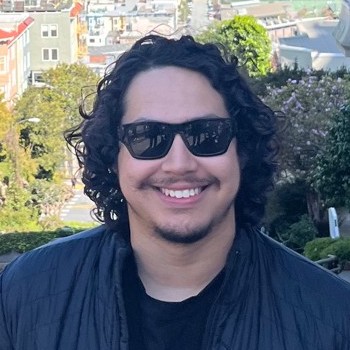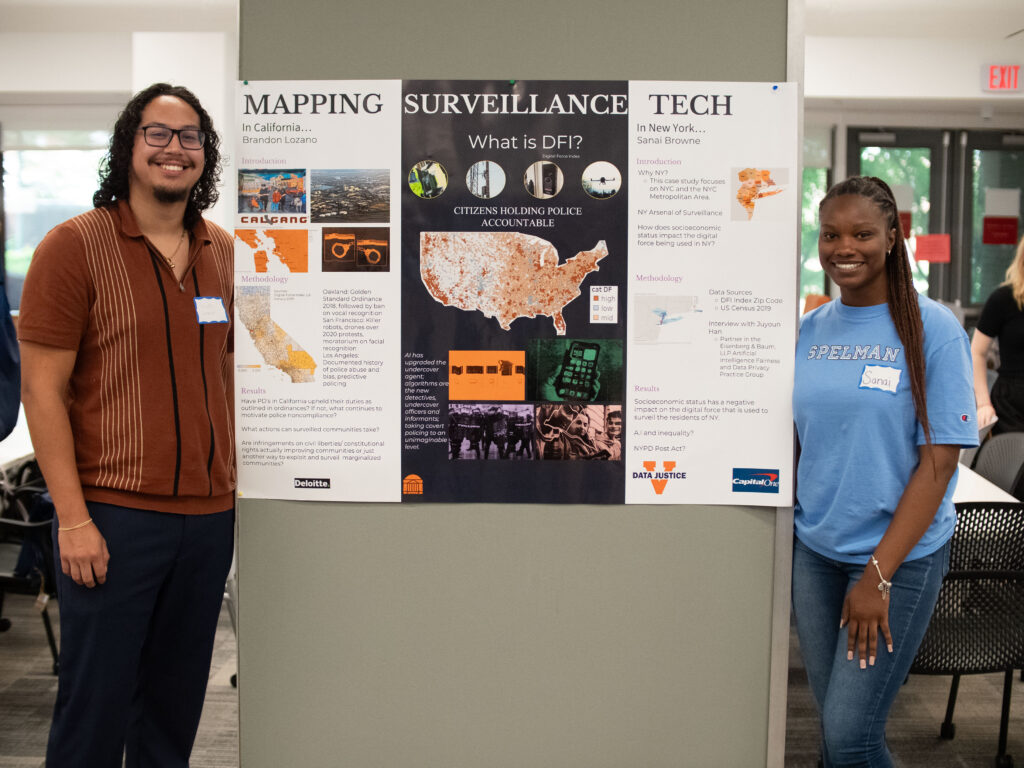Student Voices from the UVA Data Justice Academy
Climate Change
September, 2023


Author: Sanai Browne is a junior at Spelman College majoring in psychology. Originally from Long Island, New York, she hopes to become a criminal/forensic psychologist. She participated in UVA’s Data Justice Academy because of its focus on including multiple disciplines and underrepresented groups in data science.
Author: Brandon Lozano is a senior at the University of North Carolina at Chapel Hill majoring in political science and computer science and minoring in data science. Born in Concord, North Carolina, with family roots firmly in Colombia, Brandon has a passion for helping underrepresented populations gain political and economic power. He participated in UVA’s Data Justice Academy because of its focus on citizen education and using data in the service of justice.
Over this past summer, we participated in the Data Justice Academy (DJA) at the University of Virginia, which brings students from historically underrepresented groups in STEM to campus for mentored research, technical skills training, and professional development. Data Justice fellows are welcomed from all over the world and represent a variety of backgrounds and areas of study. As fellows, we worked on Data for Good research projects geared toward improving lives, combating inequality, and guiding social change. We attended seminars and workshops to hone technical skills in Python, R, Tableau, Zotero, and other programs, and we explored the harms and inequalities of technology related to algorithmic bias, privacy, and data activism through a seminar on data ethics and justice. Participants were at different levels of experience in data science.
As a psychology major, I feel it is important to have experience with data research, and as a Black woman I saw this program as an opportunity for me to flourish in a space with people who look like me.
Sanai Browne
Together, we worked on DJA case studies on police surveillance in New York (Sanai) and California (Brandon), building off of professor Renée Cummings’ digital force index. The DFI is an interactive risk rating system of surveillance technologies that measures the intensity of algorithmic force deployed by police departments. Professor Cummings served as our faculty mentor, giving us a lot of autonomy regarding our research presentations while offering support in the technical and investigative skills we initially lacked. Since the beginning of the program, we have further developed our skills with Python, R, Tableau, Zotero, CSV databases, data visualizations, data ethics, FIPS level data, and general data cleaning/wrangling.

Without a doubt, the most challenging, and memorable, moment was the research presentation poster walk. Neither of us had experience with a research poster walk, and we were unsure if we had enough content or if our format was unconventional. In the end, everything came out great. During the poster walk, listeners were engaged and responsive, asking questions, leaving comments on how impactful the presentation had been, and remarking that they were impressed with how we presented our work.
As a first-generation immigrant, I feel compelled to advocate for marginalized communities and educate others on political, economic, and technological power and how it can be wielded against us.
Brandon Lozano
Together, we worked on DJA case studies on police surveillance in New York (Sanai) and California (Brandon), building off of professor Renée Cummings’ digital force index. The DFI is an interactive risk rating system of surveillance technologies that measures the intensity of algorithmic force deployed by police departments. Professor Cummings served as our faculty mentor, giving us a lot of autonomy regarding our research presentations while offering support in the technical and investigative skills we initially lacked. Since the beginning of the program, we have further developed our skills with Python, R, Tableau, Zotero, CSV databases, data visualizations, data ethics, FIPS level data, and general data cleaning/wrangling.
Data & Power
The DJA program helped us understand how accepting data as it is — without questioning the systems and conditions that produce the data — is a common misstep in data science that perpetuates historical inequalities.
In our project, Brandon highlighted how racially biased policing can still corrupt even the most forward-looking algorithms. Algorithms or artificial intelligence will not magically overcome racial or gender discrimination or other societal problems, and we must understand this limitation in order to truly create forward-looking systems.
Sanai sought to better understand the relationship between income inequality in New York and digital force. After analyzing the data and finding the general trend of higher digital force in areas with higher income inequality (which tended to be minority communities), Sanai strove to understand and expose the ways in which police obfuscate their surveillance to keep citizens from understanding how much their civil rights are violated on a day-to-day basis.
We hope our work will raise awareness on police surveillance and the power of data justice in general. We also hope that the holistic approach we took with our project and data, encouraged by professor Cummings, her team of data scientists Sarah Adams and Claire Setser, and the UVA School of Data Science, will become more prevalent in the field.
